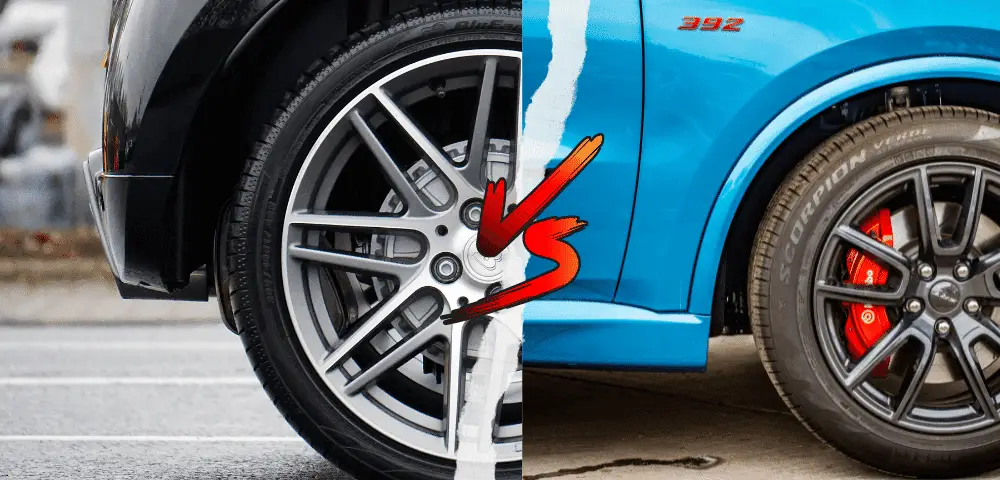Getting a flat tire can range from a minor inconvenience to something incredibly frustrating and unsafe. No matter how much of an expert you are, flat tires aren’t something that you’ll be able to drive with.
That’s where run-flat tires can help out. Today’s matchup is run-flat tires vs regular tires. Which one’s a better choice for you? Let’s find out!
What Are Run-Flat Tires?
Before proceeding with the run-flat vs regular tires matchup, the question you should ask is what are run-flat tires and how do they work?
The answer is extremely simple, run-flat tires, in their essence, are capable of supporting the weight of a running car for a limited amount of time despite losing air or getting damaged.
Run-flat tires give you ample time to drive to the nearest repair shop. These tires have essential characteristics which you’ll find regardless of which company manufactured them. This includes stiffer and reinforced sidewalls.
Just like regular tires, you’ll also find different kinds of run-flat tires such as
- All-Season
- Winter
- Summer
Run Flat Tires vs Regular Tires: The Main Differences
If you have ever experienced a tire blowout, you’ll be able to understand how dangerous the situation can turn out to be. Blowouts directly affect your ability to control your car and can cause it to swing in one direction or another.
Getting control of your car back is a difficult task that even the most seasoned drivers might struggle with. Hence, no matter your skills behind the wheel, the possibility of a devastating accident occurring due to a tire blowout is incredibly high.
Here’s where run-flat tires step in. They make all the difference between getting stuck in the middle of the road and actually being able to ride your car.
These tires are also more stable compared to the regular tires currently available in the market.
Meaning that even in a tire blowout, you’ll not only be able to gain back control of your car much faster, but you’ll also be able to run your car without tire pressure for a few miles.
What’s The Average Lifespan of Run Flat Tires?
Considering how much more expensive a run-flat tire is compared to regular tires in the market, you might be expecting a run-flat tire to have a long replacement time.
However, a run-flat tire is mostly similar to a regular tire.
This means that both kinds of tires have the same average lifespan of 30,000 to 40,000. It’s noted that you’ll need to replace run-flat tires faster than you would have replaced regular ones.
Run Flat Tires Vs Regular Tires: What Should You Choose?
If you’re still confused about which kind of tires to choose for your new car, the following section might help you make your choice.
Quality
The quality of run-flat tires and regular tires is mostly the same. If you buy tires from premium brands like Bridgestone or others, you can rest assured about the quality of the tires regardless of what type of tire you buy.
Who’s More Durable
When it comes to the test of durability, run-flat tires will mostly fall behind regular tires.
Run-flat tires have reduced treadwear, meaning that you’ll most likely have to replace this type of tire earlier than a regular one.
The reason behind this difference isn’t clear but one theory suggests that this is a side effect related to the inclusion of a soft thread compound.
Most Affordable
Run-flat tires can cause a far deeper dent in your wallet compared to regular tires. On average, you can expect to pay around $50 more for run-flat tires.
However, while these tires ask for a larger investment, they also work to save you a lot of cost in the long run.
This includes eliminating the need for buying service tools or a spare wheel. Run-flat tires can also provide you with an additional room in your car for storage.
If you think you’re ready to pay a little extra for these benefits, then the tires are well worth their premium cost.
Ride Comfort/Road Noise
There’s a reason why the debate on run-flat tires vs regular tires has no clear winner.
Not only are regular tires more affordable, but they also provide a far more comfortable ride compared to run-flat tires.
This is because the mechanics that allow the run-flat tires to function without air also results in stiffer sidewalls leading to a much harsher ride.
Handling
You won’t find any significant differences while handling your car between regular or run-flat tires.
But to be technical, you’ll find the jury leaning a bit more on the side of regular tires under normal circumstances.
The main difference between the two, however, is within their response to having a blowout or being punctured.
The run-flat clearly offers better stability and handling when it comes to that.
Potential Problems of Run Flat Tires
Despite the numerous benefits of getting run-flat tires for your car, there are a few drawbacks you must consider.
Lack Of a Spare Tire
Most drivers who equip their cars with run-flat tires generally do not keep a spare wheel as getting one mostly eliminates the need for keeping a spare at hand.
Without having a dedicated space for tools and a wheel, you can get a lot of free room in your car which you can utilize as you want.
However, in a situation where the leverage provided by the run-flat tire isn’t enough, you’ll be stuck without a spare wheel to use.
You’re Not Safe from Tire Blowouts
Getting a run-flat tire doesn’t automatically make your car fully proofed against tire blowouts. Blowouts generally depend on how well you maintain your tires.
If you don’t follow the speed limit or consistently check your tire’s air pressure, you’ll most likely have to deal with a flat tire even if you have run-flat tires.
Difficult To Maintain the Tire
Checking the air pressure of your run-flat tire is easier said than done. One construction flaw in the design of run-flat tires is that their stiff sidewalls do not show any signs of low air pressure.
Unlike a regular tire where you can judge air pressure visually, here you’ll require constant use of a tire pressure monitoring system.
Lack Of Availability
Run-flat tires aren’t something you’ll find in every other repair shop.
Since this product mostly targets a small market, you’ll have to be on the lookout to find shops where run-flat tires are available.
This isn’t a significant problem if you live in a large city but if you’re traveling on the city’s outskirts, you’ll be hard-pressed to find run-flat tires easily.
I Don’t Like My Run-Flats, Can I Replace Them with Regular Tires?
Some vehicles come equipped with run-flat tires instead of regular tires such as a growing number of BMWs. While this change might be acceptable to some, others would prefer to drive on regular tires.
So, can you replace the run-flat tires of your BMW or any other car without experiencing any problems?
The simple answer is yes. You just need to be mindful about what the manufacturing requirements of your car are.
You also need to consider just how services like TPMS, internal programming, etc.
Could get affected if you replace run-flat tires with regular and conventional ones.
It’s also important to note that any cars which were installed with run-flat tires do not come with service equipment.
This includes a spare tire, rim, hand jack, etc.
What Are All the Alternatives?
While run-flat tires seem to have many problems, you can’t deny their usefulness.
At the same time, regular tires, despite having no ability to sustain the car’s weight without air pressure, give a far better performance for daily use.
If you’re confused between the two, you can also take a closer look at self-sealing tires.
While self-sealing tires don’t allow you to drive your car on a flat tire, they come integrated with a sealant layer that maintains air pressure if there’s a small puncture.
Self-sealing tires also come with their own set of problems, such as high cost and lack of availability.
But this tire still stands as a good alternative for both run-flat and regular tires.
Final Thoughts
Run-flat tires are excellent tires to have in case your car has a tire blowout.
They add an extra layer of safety that doesn’t exist with regular tires and give you far better control on the road during an emergency.
However, run-flat tires come with their own set of problems that are more significant than the benefits they provide.
If you’re planning on getting run-flat tires or are thinking of replacing them, you should consider all factors before committing.
You can also consider other alternatives such as self-sealing tires which act as an alternative to both types of tires to make an informed decision.


